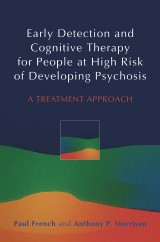Details

Early Detection and Cognitive Therapy for People at High Risk of Developing Psychosis
A Treatment Approach1. Aufl.
|
50,99 € |
|
| Verlag: | Wiley |
| Format: | |
| Veröffentl.: | 14.05.2004 |
| ISBN/EAN: | 9780470863169 |
| Sprache: | englisch |
| Anzahl Seiten: | 176 |
DRM-geschütztes eBook, Sie benötigen z.B. Adobe Digital Editions und eine Adobe ID zum Lesen.
Beschreibungen
Written with clinicians in mind, this book demonstrates the use of Cognitive Behavior Therapy with individuals who are at risk of developing psychosis. Divided into three parts, the book opens with the background to the clinical trial including the rationale for the early intervention strategy, assessment strategies to identify "at risk" groups, and a review of prevention strategies. In Part II the focus is on the application of cognitive therapy for this group. Part III examines strategies for change, as well as specific issues including social isolation and relapse prevention.
<p>List of Figures and Appendices vii</p> <p>About the Authors ix</p> <p>Foreword by Max Birchwood xi</p> <p>Introduction xiii</p> <p>Acknowledgements xvii</p> <p><b>Part I: Background 1</b></p> <p>1 The Importance of Early Recognition 3</p> <p>2 How to Identify At-Risk Groups 9</p> <p>3 Which Prevention Strategy to Adopt 23</p> <p><b>Part II: Cognitive Therapy for Prevention of Psychosis 27</b></p> <p>4 Why Cognitive Therapy? 29</p> <p>5 Engagement 37</p> <p>6 Theory, Assessment and Formulation 45</p> <p><b>Part III: Change Strategies 55</b></p> <p>7 Normalisation 57</p> <p>8 Generating and Evaluating Alternative Explanations 65</p> <p>9 Safety Behaviours 75</p> <p>10 Metacognitive Beliefs 87</p> <p>11 ‘I Am Different’ and Other Core Beliefs 93</p> <p>12 Social Isolation 101</p> <p>13 Relapse Prevention 111</p> <p>14 Conclusions 117</p> <p>Appendices 121</p> <p>References 135</p> <p>Index 143 </p>
“…an easy to read guide…” (<i>Behavioural & Cognitive Psychology</i>, Vol. 33 2005) <p>"...well researched, well written and easily understood...of interest to all who work with high-risk adolescents and young adults..." (<i>Intl Jnl of Clinical Practice</i>, June 2004)</p> <p>"...extremely interesting and highly readable..." (<i>Mental Health Today</i>, September 2004)</p> <p>"Strong stuff...[the authors] offer some well-researched loyalty truths" (<i>Daily Telegraph</i>, 22nd November 2005)</p> <p>"...an excellent introduction...illuminating but concise..." (<i>BACP</i>, December 2005)</p>
<b>Paul French</b> is co-ordinator of a specialist clinical team based at Bolton, Salford & Trafford Mental Health Trust offering cognitive interventions for people who are considered at high risk of developing psychosis. He has worked in mental health since 1989 and has always been interested in the provision of services for people with psychosis having worked in a variety of inpatient and community settings. More recently, he has developed a research interest in working with people at high risk of developing psychosis.Hehas published a number of articles relating to early psychosis and particularly the provision of psychological interventions in early psychosis. <p><b>Anthony P. Morrison</b> is a reader in psychology at the University of Manchester and is also programme co-ordinator for a specialist programme of care for people with early psychosis in Bolton, Salford & Trafford Mental Health Trust. He has published a number of articles on cognitive therapy for psychosis and experimental studies of cognitive processes in psychosis. He has been involved in a number of treatment trials for cognitive therapy for psychosis and has a special interest in the cognitive theory of and therapy for hearing voices. More recently, he has developed a research interest in working with people at high risk of developing psychosis and the links between trauma and psychosis. He was awarded the May Davidson Award 2002 for his contributions to clinical psychology.</p>
"Can schizophrenia be prevented? French and Morrison, major investigators in the landmark study demonstrating that schizophrenia can be prevented, provide specific details about the adaptation of standard cognitive therapy to the treatment of individuals at high risk of developing this disorder. In a clear readable style, they guide the reader through the identification of high-risk individuals, crucial cognitive behavioral strategies and, above all, relapse prevention. This book is a must for clinicians dealing with high-risk adolescents and young adults."<br /> —Aaron T. Beck, M.D., University Professor of Psychiatry, University of Pennsylvania <p>"French and Morrison's theoretical framework is coherent and well articulated and brings to bear cognitive and interpersonal factors that we know to be active in established psychosis. The therapy they describe has been validated in a well controlled randomised trial showing that psychosis can be prevented, or at least delayed, in a substantial majority of those at risk of transition to psychosis."<br /> —Professor Max Birchwood, Director, Early Intervention Service, Northern Birmingham Mental Health Trust and University of Birmingham</p> <p>This book will be of use to all qualified and trainee practitioners, such as clinical psychologists, psychiatrists, social workers, occupational therapists and nurses. It will also appeal to students, lecturers and researchers.</p>
Diese Produkte könnten Sie auch interessieren:

The Wiley-Blackwell Handbook of Childhood Social Development

von: Peter K. Smith, Craig H. Hart

136,99 €
















